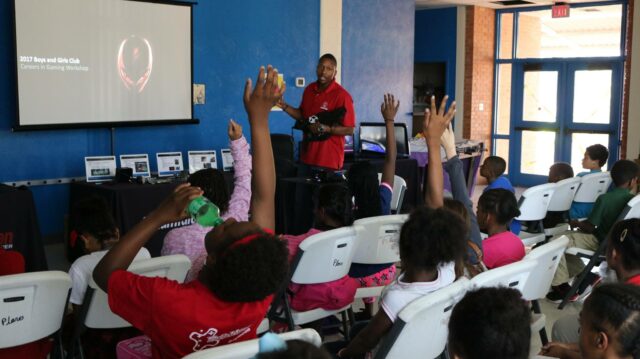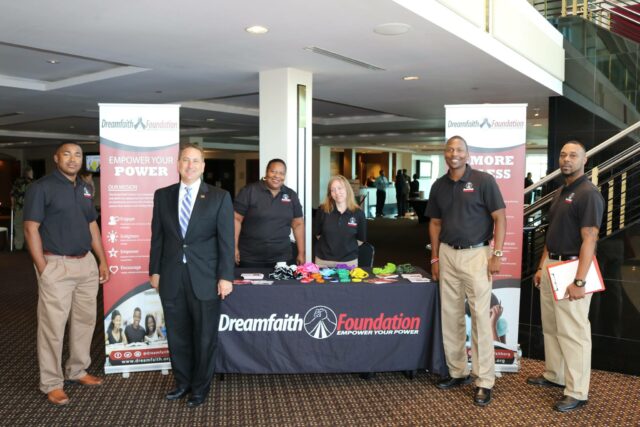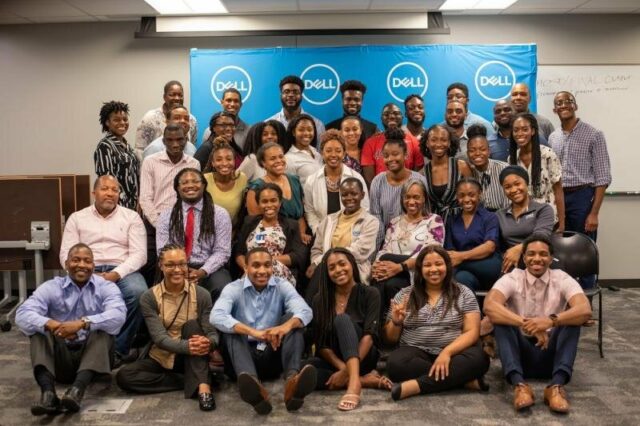By Camille Kail, contributor, Dell Technologies
Deonte Thompson, senior director of the Software and Transformation Program Management Office at Dell Technologies, has wisdom to share. From advocating for STEM programming in early education to his work with incarcerated people to being at the forefront of corporate inclusion efforts, he truly embodies the spirit of suffragist and civil rights champion Mary Church Terrell and her hopes for her community: “Striving and hoping that the buds and blossoms of our desires will burst into glorious fruition.” Thompson serves as an inspiration for finding a sense of purpose through work. According to Dell’s Breakthrough study, 48% of workers polled say they have a clear opportunity to make a positive social impact in their role. For our Breakthrough Champions series, Thompson discusses finding purpose in work and his experiences as a Black engineer, a mentor, a senior leader and DEI advocate.
You’ve been at Dell for 21 years in various positions, from validating early PowerEdge servers to having a hand in mergers and acquisitions. Can you tell us how you found your way to Dell and what’s kept you at the company for so long?
I began my career at Dell right out of college. I actually grew up wanting to be a professional basketball player, like a lot of kids in my St. Petersburg, Florida neighborhood, but I did not play my senior year of high school, so that scuttled any chances I had of being in the NBA. One day in elementary school, I found a discarded TV that had been left in an alley. On a whim, I decided to take it home, tear it apart and see if I could figure out how its circuit board worked. There weren’t any STEM programs available to kids at the time, so I was shooting in the dark, so to speak.
That random alley discovery sparked my interest in technology, and by high school, my counselor encouraged me to apply to Florida A&M, a historically Black university, to study electrical engineering. After graduation, I was recruited to Dell Technologies as a product test engineer in Dell’s Enterprise Solutions Group.
People often ask, “What’s kept you at the same company for 20-plus years?” I definitely thought it was a good place to start my career, plus it didn’t hurt that it was the cool place to work at the time. The glue that’s really kept me here has been the company’s values and the causes that it cares about. Plus, I do a lot of things outside of my 9-to-5, and Dell actively supports people living out their purpose and giving back philanthropically.
What would you say your mission is?

Growing up, I saw a lot of violence and people going to jail in my community, so I’ve always been very compassionate about that forgotten population. When I first started at Dell, I dedicated a lot of my free time volunteering with a nonprofit organization to speak at juvenile detention centers and prisons all over Texas. It wasn’t until I started talking to kids that were 16 or 17 years old that I realized that the work that really needed to be done had to start earlier before they were incarcerated. That was when I founded the non-profit organization that I run to this day, the Dreamfaith Foundation.
Dreamfaith’s mission is to empower students by equipping them with the necessary tools to victoriously overcome life’s challenges, passionately pursue their dreams, and intelligently plan for success. In the last 15 years, we’ve awarded over 50 scholarships ranging from $500 to $1,500 per student.
How were you able to marry your nonprofit work with your engineering career?
The human element of the work I was doing outside of my duties at Dell began to seep into my 9-to-5. When the company changed its vision statement to be more human-focused, these two areas of my life began to converge. I plugged into ERGs like the Black Networking Alliance, and my salary helped to fund Dreamfaith, so I was able to direct more resources to that part of my life.
I also knew from experience that even though kids might have an interest in technology or engineering, there often weren’t enough programs available to them to nurture and develop their interests, so I became focused on reaching kids that had potential but lacked exposure to STEM.
Were you able to take advantage of any programs that helped you progress in your career? How do you engage with those programs today?

Definitely—in addition to leading the Black Networking Alliance (BNA) at Dell, I’ve also been an active participant and sponsor of the National Society of Black Engineers (NSBE) since I started. I was a member of NSBE in college, and when I started at Dell in 2001, I could go two weeks before seeing another face that looked like mine, both at work and around Austin. Those experiences inspired me to be a part of the solution to positively influence the number of Black and brown faces in corporate spaces.
There were three main insights I learned from NSBE as a college student that I wanted to carry over into my career at Dell. First, kids need exposure to STEM at an earlier age. NSBE offers programming to students as early as the third grade to spark their interests in engineering earlier and provide a more focused vision for the future.
Second, NSBE and other organizations with this shared mission provide a support system and network of accountability for students who want to become engineers and surround them with other like-minded people who may look like them so they don’t feel isolated.
Third, NSBE provides a pipeline to Fortune 100 companies and helps to place talented, young engineers in great positions at well-established companies.
For the last eight years, Dell has had a presence at NSBE’s national convention, and we’ve been able to provide opportunities for countless engineers that were routed through that organization—some of whom are still at Dell to this day!
From your perspective as an engineer and DEI leader and advocate, how do you predict that companies will evolve to meet challenges—from their pandemic response to social justice conversations that have started to surface?

I’ve seen several major shifts across the industry as it relates to the events of 2020 and beyond. There’s been an expedited digital transformation that was a long time in the works, but obviously ramped up as companies had to develop and implement remote-work and COVID-safe policies on the fly. “How do you get your company to a point where your business can thrive in this new hybrid, do-from-anywhere environment?” Dell’s Breakthrough study found that the number one barrier to innovation was a lack of technical skills, infrastructure and digital fluency. We must get teams to a place where they’re digitally fluent and allow them to build on the foundation they were operating on before to create new and innovative ways of working together—whether they’re in-person or working remotely.
We also saw a shift with regard to morality as it relates to social justice and equity. These conversations have been happening at home and in local barbershops for years, but it’s becoming increasingly difficult to separate what happens at home versus what happens at work versus what happens in the world at large. Many organizations have realized that it overwhelmingly benefits them to communicate their opinion on these issues when it comes to retaining both customers and employees. In addition, there must be correlating action taken by leadership that drives behaviors consistent with a culture code of advancing in the areas of Diversity, Equity and Inclusion. Only then will there be a shift in corporate culture that’s sustainable over time.
And marrying those two, there’s been a larger corporate cultural transformation. We’re seeing more companies focus on leadership that can sustain an empathetic and human-centered culture. We’re finding that although salaries play a role in decisions to leave companies, it’s not the primary reason. Team members leave companies because of the culture of the organization for reasons ranging from management style to value alignment and involvement.
There must be correlating action taken by leadership that drives behaviors consistent with a culture code of advancing in the areas of Diversity, Equity and Inclusion. Only then will there be a shift in corporate culture that’s sustainable over time.
–Deonte Thompson, senior director of the Software and Transformation Program Management Office, Dell Technologies
Any advice for students interested in pursuing careers in engineering or STEM?
As you’re starting out, don’t be afraid to ask lots of questions, even at the risk of looking foolish. That kind of intellectual curiosity is a prerequisite for growth. To show that you’re willing to grow, you should run towards the projects that others shy away from. I’ve made a career of taking on projects that no one else wanted, and that’s why I haven’t been bored for the last 20 years.
Lastly, find a cause that inspires your work beyond professional accolades. My personal success is not what’s driving me anymore, rather it’s knowing that my accomplishments and platform are channels of opportunities for so many others. My success isn’t just for me; it’s also for the communities I serve and the colleagues I support.
Breakthrough Champions is a series on Perspectives profiling Dell employees doing extraordinary things to advance digital transformation. The series is inspired by Dell’s “Breakthrough” platform and the belief that progress happens at the intersection of people and technology.

